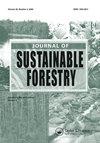影响越南REDD+参与的关键因素
IF 1.8
4区 农林科学
Q3 FORESTRY
引用次数: 0
摘要
摘要直接和间接影响参与减少毁林和森林退化排放(REDD+)计划的家庭决策的潜在因素很多。这些潜在因素可分为户主特征、家庭特征、家庭对REDD+计划的认识和REDD+政策因素。在这项研究中,对老蔡省Bao Thang区Ban Cam公社的250户家庭(包括125户参加REDD+计划的家庭和125户未参加REDD++计划的居民)进行了调查(150户);以及越南奠边省奠边区孟攀公社(100户)。二元逻辑回归用于确定显著影响研究区域内参与REDD+项目的家庭决策的关键因素。确定了影响研究地区家庭参与REDD+计划的六个关键因素,即种族、林地面积、户主的教育水平、对森林退化的担忧、政府付款的平等分配以及对REDD+利益的理解。这项研究的结果为解决方案的制定提供了启示,目的是鼓励当地家庭参与研究区域的REDD+计划。本文章由计算机程序翻译,如有差异,请以英文原文为准。
Key Factors Influencing Vietnam REDD+ Participation
ABSTRACT There is a wide range of potential factors directly and indirectly influencing the decision of households participating in Reducing emissions from deforestation and forest degradation (REDD+) programs. These potential factors can be grouped into characteristics of household heads, household characteristics, awareness of households on REDD+ program, and REDD+ policies factors. In this study, a survey conducted of 250 households (including 125 households participating and 125 non-participants in REDD+ program) in Ban Cam commune, Bao Thang district, Lao Cai province (150 households); and in Muong Phang commune, Dien Bien district, Dien Bien province (100 households), Vietnam. Binary logistic regression was used to identify key factors that significantly affect the decisions of households participating in REDD+ programs in the study area. Six key factors influencing household participation in REDD+ programs in the study area were identified, namely ethnicity, forestland area, educational level of household head, concern about forest degradation, equal distribution of government payment, and understanding of benefit on REDD+. The findings of this research provide implications for solution development, with the aim being to encourage participation of local households in REDD+ programs in the study area.
求助全文
通过发布文献求助,成功后即可免费获取论文全文。
去求助
来源期刊

Journal of Sustainable Forestry
Social Sciences-Geography, Planning and Development
CiteScore
3.90
自引率
12.50%
发文量
42
期刊介绍:
Journal of Sustainable Forestry publishes peer-reviewed, original research on forest science. While the emphasis is on sustainable use of forest products and services, the journal covers a wide range of topics from the underlying biology and ecology of forests to the social, economic and policy aspects of forestry. Short communications and review papers that provide a clear theoretical, conceptual or methodological contribution to the existing literature are also included in the journal.
Common topics covered in the Journal of Sustainable Forestry include:
• Ecology, management, recreation, restoration and silvicultural systems of all forest types, including urban forests
• All aspects of forest biology, including ecophysiology, entomology, pathology, genetics, tree breeding, and biotechnology
• Wood properties, forest biomass, bioenergy, and carbon sequestration
• Simulation modeling, inventory, quantitative methods, and remote sensing
• Environmental pollution, fire and climate change impacts, and adaptation and mitigation in forests
• Forest engineering, economics, human dimensions, natural resource policy, and planning
Journal of Sustainable Forestry provides an international forum for dialogue between research scientists, forest managers, economists and policy and decision makers who share the common vision of the sustainable use of natural resources.
 求助内容:
求助内容: 应助结果提醒方式:
应助结果提醒方式:


